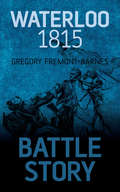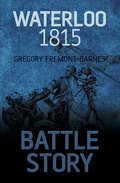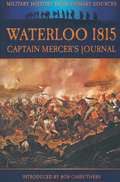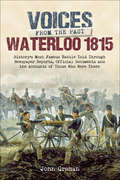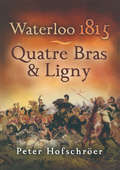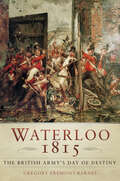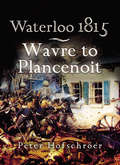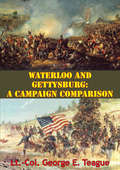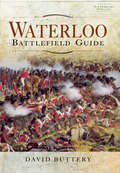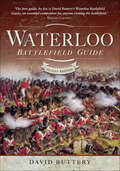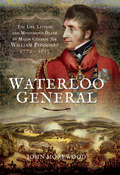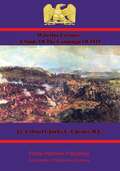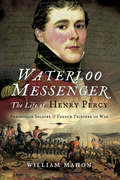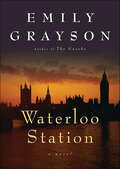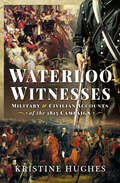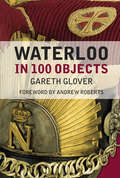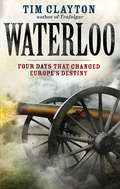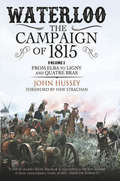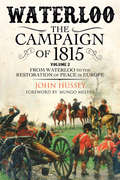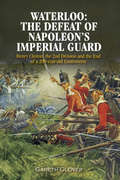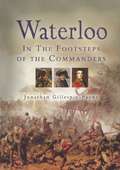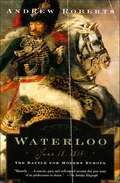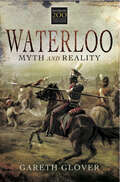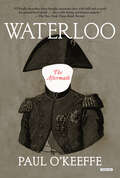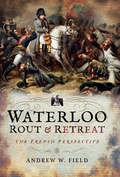- Table View
- List View
Waterloo 1815
by Gregory Fremont-BarnesThe Battle of Waterloo is one of the most important moments in military history. The might of the French Empire under the leadership of the Emperor Napoleon faced the Coalition army under Duke of Wellington and Gerhard von Blucher for one last time at Waterloo. The battle saw the culmination of a long campaign to destroy Napoleon’s forces and halt the growth of the French Empire. Both sides fought bitterly, and Wellington later remarked that “it was the nearest-run thing you ever saw in your life.” Both armies lost over 20,000 men on the battlefield that day, but it was the coalition that emerged victorious in the end. Wellington’s army counter-attacked and threw the French troops into disarray as the fled from the field. The coalition forces entered France and restored Louis XVIII to the throne. Napoleon was exiled to the island of Saint Helena, where he later died. Waterloo was a resounding victory for the British Army and changed the course of European history. This Battle Story tells you everything you need to know about this critical battle.
Waterloo 1815: Battle Story
by Gregory Fremont-BarnesOne of the most decisive battles in military history, Waterloo saw the culmination of a generation of war to bring a definitive end to French hegemony and imperial ambitions in Europe. Both sides fought bitterly and Wellington later remarked that ‘it was the nearest-run thing you ever saw in your life’.In this bloody engagement, more than 20,000 men were lost on the battlefield that day by each side, but it was the Anglo-Allies who emerged victorious. Their forces entered France and restored Louis XVIII to the throne, while Napoleon was exiled to the island of Saint Helena, where he later died.Waterloo was a resounding victory for the British Army and Allied forces, and it changed the course of European history. In this concise yet detailed account, historian Gregory Fremont-Barnes tells you everything you need to know about this critical battle.
Waterloo 1815: Captain Mercers Journal (Military History from Primary Sources)
by Bob CarruthersMore has probably been written about the Waterloo campaign than almost any other in history. It was the climax of the Napoleonic Wars and forms a watershed in both European and world history. However, the lethal combination of national bias, wilful distortion and simple error has unfortunately led to the constantly regurgitated traditional 'accepted' version being significantly wrong regarding many episodes in the campaign. Oft-repeated claims have morphed into established fact and, with the bicentenary of this famous battle soon to be commemorated, it is high time that these are challenged and finally dismissed.Gareth Glover has spent a decade uncovering hundreds of previously unpublished eyewitness accounts of the battle and campaign, which have highlighted many of these myths and errors. In this ground-breaking history, based on extensive primary research of all the nations involved, he provides a very readable and beautifully balanced account of the entire campaign while challenging these distorted claims and myths, and he provides clear evidence to back his version of events. His thoughtful reassessment of this decisive episode in world history will be stimulating reading for those already familiar with the Napoleonic period and it will form a fascinating introduction for readers who are discovering this extraordinary event for the first time.
Waterloo 1815: History's Most Famous Battle Told Through Newspaper Reports, Official Documents and the Accounts of Those Who Were There (Voices from the Past)
by John GrehanFor more than twenty years Europe had been torn apart by war. Dynasties had crumbled, new states had been created and a generation had lost its young men. When it seemed that peace might at last settle across Europe, terrible news was received Napoleon had escaped from exile and was marching upon Paris. Europe braced itself once again for war. The allied nations agreed to combine against Napoleon and in May 1815 they began to mass on France's frontiers. The scene was set for the greatest battle the world had yet seen.Composed of more than 300 eyewitness accounts, official documents, parliamentary debates and newspaper reports, Voices from the Past tells the story of Napoleon's last battles as they were experienced and reported by the men and women involved. Heroic cavalry charges, devastating artillery bombardments, terrible injuries, heart-breaking encounters, and amusing anecdotes, written by aristocratic officers and humble privates alike, fill the pages of this ambitious publication. Many of these reports have not been reproduced for almost 200 years.
Waterloo 1815: Quatre Bras
by Peter HofschröerThe Battle of Waterloo marked the climax of four extraordinary months. Napoleon returned from exile, ousted the unpopular King Louis XVIII, and then turned to launch a pre-emptive strike against the Allied armies assembling in the United Netherlands. Here Napoleon met Wellington who had cobbled together an army with contingents from the British, the United Netherlands and the Prussians, firstly at Quatre Bras and then finally at Waterloo.This is the second book in the series to cover the battle following on from Hougoumont.
Waterloo 1815: The British Army's Day of Destiny
by Gregory Fremont-BarnesWriting to his mother the day after the fighting, Captain Thomas Wildman of the 7th Hussars described ‘a victory so splendid & important that you may search the annals of history in vain for its parallel’. Little wonder, for Waterloo was widely recognised – even in its immediate wake – as one of the most decisive battles in history: after more than twenty years of uninterrupted conflict, this single day’s encounter finally put paid to French aspirations for European hegemony. The culminating point of the French Revolutionary and Napoleonic Wars, Waterloo also witnessed levels of determination and bravery by both sides which far exceeded anything experienced by the veterans of Wellington’s recent campaigns in Spain and Portugal. Indeed, it was that unconquerable spirit which left over 50,000 men dead on the field of battle and tens of thousands of others wounded.This thoroughly researched and highly detailed account of one of history’s greatest human dramas looks first at the wider strategic picture before focusing on the tactical roles played by individual British units – all meticulously examined with the benefit of an extensive array of hitherto unexploited primary sources which reveal the battlefield experience of officers and soldiers as never before.Refusing simply to repeat the same unchallenged accounts and to commit the same errors of previous historians, this work relies exclusively on hundreds of first-hand accounts, by men of all ranks and from practically every British regiment and corps present on that fateful day, to provide a fresh and revised perspective on one of the most pivotal events of modern times.
Waterloo 1815: Wavre, Plancenoit And The Race To Paris
by Peter HofschröerThe acclaimed historian sheds new light on the Battle of Waterloo and the defeat of Napoleon with a focus on the Prussian Army&’s critical contribution. Histories of the Waterloo campaign that brought an end to the Napoleonic Wars generally concentrate on the battle between the armies of Napoleon Bonaparte and the Duke of Wellington, giving Field Marshal Blücher's Prussian forces only passing attention. But in this fascinating historical analysis of the conflict, Peter Hofschröer provides a full account of the Prussians and their critical but often neglected side of the battle. Hofschröer vividly recounts the grueling Prussian advance towards the battlefield and the ferocious and decisive fight that broke out when they arrived. At every stage, he allows the reader to follow in the footsteps of the Prussian soldiers as they struggled across the Belgian countryside on that fateful day in 1815.
Waterloo And Gettysburg: A Campaign Comparison
by Lieutenant-Colonel George E. TeagueIn June of 1815 Napoleon led French forces on an offensive campaign into Belgium against the Allied Anglo-Dutch and Prussian armies under Wellington and Blucher. During this campaign Napoleon and several of his marshals made serious errors that led to missed opportunities for victory and ultimately to defeat at Waterloo. Less than 50 years later Robert E. Lee led Confederate forces on an offensive campaign into Maryland and Pennsylvania against the Union Army under Hooker initially, then Meade. A meeting engagement near Gettysburg, Pennsylvania led to three days of fighting during which Lee and several of his generals made critical errors that allowed opportunities for victory to pass and ultimately led to decisive defeat.These campaigns were remarkably alike in a number of ways. This paper reviews the campaigns and discusses similarities in the strategic settings, campaign objectives, size and disposition of forces, battlefield terrain, tactics employed, and leadership of each army. In particular, the paper compares the performances of selected French and Confederate leaders and how they contributed to the defeat of their respective armies. These comparisons provide valuable lessons learned for the conduct of future military operations.
Waterloo Battlefield Guide
by David ButteryA British military historian offers an expert introduction to The Battle of Waterloo in this essential companion for battlefield visitors. In Belgium on June 18th, 1915, the Battle of Waterloo marked the climax of the Napoleonic Wars—and a major turning point in world history. The combined forces of the Duke of Wellington and Field Marshal von Blücher delivered a devastating defeat to Napoleon. Though the outcome would have a major influence on the shape of Europe for more than a century, the battle itself cannot be properly understood without a detailed study of the landscape in which it was fought. Using eyewitness accounts and an intimate knowledge of the terrain, historian David Buttery vividly reconstructs the events of Waterloo as he takes readers across the battleground as it exists today. He provides essential context for understanding pivotal episodes in combat, including the day-long struggle for the chateau at Hougoumont, the massive French infantry assaults, repeated cavalry charges, the fall of La Haye Sainte, the violent clashes in the village of Plancenoit, the repulse of the Imperial Guard and rout of the French army.
Waterloo Battlefield Guide: Battlefield Guide
by David ButteryMuch of the material available to readers in the English language interested in the exploits of the troops of Hanover, Brunswick and Nassau is in the form of dry official reports, which stick to the basic facts and avoid all sentimentality and emotion. However, unbeknown to virtually anyone in the English-speaking world interested in the more human aspects of these 'foreign' troops fighting alongside the British at Waterloo, there are a number of memoirs and sets of letters, which have been published in Germany over the last two centuries. Until now, these had never been translated into English and so have been inaccessible to the vast majority. This volume seeks to put this right and to bring to life the human story of these German troops their trials and tribulations, their sufferings and their emotions and to finally reveal their views on the battle which many entered with mixed emotions. Highlights include an account of the confusion in the final great advance at Waterloo; eyewitness recollections of the defense of La Haye Sainte; rare battle reports by the Duke of Wellington; and a fascinating series of letters explaining the whereabouts of a number of 'missing' Hanoverian regimental and staff surgeons and subsequent court martials.
Waterloo General: The Life, Letters and Mysterious Death of Major General Sir William Ponsonby, 1772–1815
by John MorewoodThe defeat of Napoleons French army by the combined forces of Wellington and Blcher at Waterloo on 18 June 1815 was a turning point in world history. This was the climax of the Napoleonic Wars, and the outcome had a major influence on the shape of Europe for the next century and beyond. The battle was a milestone, and it cannot be properly understood without a detailed, on-the-ground study of the landscape in which it was fought and that is the purpose of David Butterys new battlefield guide. In vivid detail, using eyewitness accounts and an intimate knowledge of the terrain, he reconstructs Waterloo and he takes the reader and the visitor across the battleground as it is today. He focuses on the pivotal episodes in the fighting the day-long struggle for the chateau at Hougoumont, the massive French infantry assaults, repeated cavalry charges, the fall of La Haye Sainte, the violent clashes in the village of Plancenoit, the repulse of the Imperial Guard and rout of the French army. This thoroughgoing, lucid, easy-to-follow guide will be a fascinating introduction for anyone who seeks to understand what happened on that momentous day, and it will be an essential companion for anyone who explores the battlefield in Belgium.
Waterloo Lectures: A Study Of The Campaign Of 1815
by Lt.-Colonel Charles C. Chesney R.E.This ebook is purpose built and is proof-read and re-type set from the original to provide an outstanding experience of reflowing text for an ebook reader. Waterloo Illustration Pack - 14 maps/battle plans, 18 portraits of the personalities engaged, 10 illustrations. The Waterloo campaign of 1815 was a turning point in world history. After 25 years of almost constant warfare that raged from India to Canada, from South America to the Caribbean, peace among the European powers was decided on a small strip of land in modern day Belgium. The momentous fruits of the campaign have led to the decisions and actions of the belligerents and their armies to be argued back and forth ever since. Colonel Chesney's work is amongst a handful of books that are considered to be "standard" as histories of the campaign that have been translated into French and German. It is fitting that the work of such a learned soldier, who is also a late professor of Military Art and History at the Staff College in Camberley, should be such a balanced and detailed account of the campaign. This ebook is based on the 4th edition which includes all of the changes that Colonel Chesney wished to be incorporated until his untimely death and was published posthumously. Title - Waterloo Lectures: A Study Of The Campaign Of 1815 (4th Edition) Author -- Lt.-Colonel Charles C. Chesney R.E. (1826-1876) Text taken, whole and complete, from the edition published in 1907, London, by Longmans, Green and Co. Original - xiv and 251 pages. Illustrations - The original map cannot be provided with this edition due to its A3 size - We have added our Waterloo Illustration pack to ensure that the reader can follow the text.
Waterloo Messenger: The Life of Henry Percy: Peninsular Soldier & French Prisoner of War
by William MahonAt the Battle of Waterloo Sir William Ponsonby, a man who the Duke of Wellington stated had rendered very brilliant and important services and was an ornament to his profession, was killed by French lancers after leading the Union Brigade (the three Dragoon Regiments of the Royals, Iniskillings and Scots Greys) in a charge that wrecked a French advance that threatened Wellington with defeat. Sir William was a career soldier who had led his regiment in the decisive charge at the Battle of Salamanca and served with great distinction during the Peninsular War. Yet historians have blamed him because the charge at Waterloo got out of hand. In this book John Morewood uses family sources, including Sir Williams letters, as well as French and German accounts, to restore his reputation and, by shedding new light on the battle, establishes what really happen to him on that fatal afternoon. It is also a biography of a man whose bravery and professionalism distinguished him as one of the outstanding cavalry commanders of the age.
Waterloo Station: A Novel
by Emily GraysonThese were days of uncertainty and peril, of noble deeds and great sacrifice.An exciting time to be young and adventurous . . . but a dangerous time to fall in love.
Waterloo Witnesses: Military and Civilian Accounts of the 1815 Campaign
by Kristine HughesThe events of Sunday, 18 June, stand as the defining moment of the year 1815, if not of an entire era. The allied victory over Napoleon’s French army at the Battle of Waterloo reshaped governments and boundaries, made or broke fortunes and touched thousands of lives in ways both large and small, and it has been analysed, dissected and refought on paper a hundred times. Perhaps, though, the very best words ever written about that momentous campaign are the first-person accounts recorded as events unfolded. It is these vivid accounts that Kristine Hughes has collected together in order to convey the hopes, fears and aspirations of their authors. They inject the story of the battle with a level of humanity that reclaims it from the realm of legend and restores it to the people who witnessed it. In chronological order her work pieces together a novel view of the battle and events surrounding it as they were experienced by both military men and civilians. The result is a fascinating and varied picture of the individuals involved and the society of the period. Their words make compelling reading.
Waterloo in 100 Objects
by Gareth Glover Andrew RobertsObjects allow us to reach out and touch the past and they play a living role in history today. Through them we can come closer to the reality experienced by the soldiers who fought at Waterloo – that most iconic of all battles. Using stunning photography, rare objects from the Napoleonic era tell us their story of the battle. From the discomfort of the uniforms to the drama of the battle-drums echoing across the battlefield, by examining each object and its place in the Waterloo story, we reach a deeper understanding of what happened on the battlefield and its significance today. Gareth Glover takes us on fascinating journey through 100 objects, from the rare to the memorable, in a unique testimony to importance of the battle of Waterloo, 200 years on.
Waterloo: Four Days that Changed Europe's Destiny
by Tim Clayton'A fabulous story, superbly told' Max HastingsThe bloodbath at Waterloo ended a war that had engulfed the world for over twenty years. It also finished the career of the charismatic Napoleon Bonaparte. It ensured the final liberation of Germany and the restoration of the old European monarchies, and it represented one of very few defeats for the glorious French army, most of whose soldiers remained devoted to their Emperor until the very end. Extraordinary though it may seem much about the Battle of Waterloo has remained uncertain, with many major features of the campaign hotly debated. Most histories have depended heavily on the evidence of British officers that were gathered about twenty years after the battle. But the recent publication of an abundance of fresh first-hand accounts from soldiers of all the participating armies has illuminated important episodes and enabled radical reappraisal of the course of the campaign. What emerges is a darker, muddier story, no longer biased by notions of regimental honour, but a tapestry of irony, accident, courage, horror and human frailty.An epic page turner, rich in dramatic human detail and grounded in first-class scholarly research, Waterloo is the real inside story of the greatest land battle in British history, the defining showdown of the age of muskets, bayonets, cavalry and cannon.
Waterloo: From Elba to Ligny and Quatre Bras
by John HusseyThis, the fourth volume in Andrew Field's highly praised study of the Waterloo campaign from the French perspective, depicts in vivid detail the often neglected final phase the rout and retreat of Napoleon's army. The text is based exclusively on French eyewitness accounts which give an inside view of the immediate aftermath of the battle and carry the story through to the army's disbandment in late 1815. Many French officers and soldiers wrote more about the retreat than they did about the catastrophe of Waterloo itself. Their recollections give a fascinating insight to the psyche of the French soldier. They also provide a firsthand record of their experiences and the range of their reactions, from those who deserted the colors and made their way home, to those who continued to serve faithfully when all was lost. Napoleons own flight from Waterloo is an essential part of the narrative, but the main emphasis is on the fate of the beaten French army as it was experienced by eyewitnesses who lived through the last days of the campaign.
Waterloo: From Waterloo to the Restoration of Peace in Europe
by John HusseyWinner of the 2019 RUSI Duke of Wellington Medal for Military HistoryWinner of the 2017 Society for Army Historical Research Templer MedalShortlisted for Military History Monthly's "Book of the Year" AwardThe first of two groundbreaking volumes on the Waterloo campaign, this book is based upon a detailed analysis of sources old and new in four languages. It highlights the political stresses between the Allies, and their resolution; it studies the problems of feeding and paying for 250,000 Allied forces assembling in Belgium during the undeclared war, and how a strategy was thrashed out. It studies the neglected topic of how the slow and discordant Allies beyond the Rhine hampered the plans of Blcher and Wellington, thus allowing Napoleon to snatch the initiative from them. Napoleons operational plan is analyzed (and Soult's mistakes in executing it). Accounts from both sides help provide a vivid impression of the fighting on the first day, 15 June, and the volume ends with the joint battles of Ligny and Quatre Bras the next day.
Waterloo: Henry Clinton, the 2nd Division and the End of a 200-year Old Controversy
by Gareth Glover&“This in-depth study of the nuts and bolts of a single division is without a doubt the best book I have ever read on Waterloo.&”—The Napoleon Series Winner of the 2017 Society for Army Historical Research Templer Medal This is the most detailed account of the 2nd Division at Waterloo ever published. It is based on the papers of its commander Sir Henry Clinton, and it reveals for the first time the previously unrecognized vital role this division made in the defeat of Napoleon. Author Gareth Glover explains how the division was placed ahead of the main allied squares thus impeding the charges of the French cavalry, and how the 2nd Division supported the defense of Hougoumont, considered by the Duke of Wellington as the key to his victory on 18 June 1815. Perhaps the most significant aspect of this book is the description of the defeat of Napoleon&’s Imperial Guard. Just how the incomparable Guard was stopped and then driven from the battlefield is explained in detail. Once and for all, this 200-year controversy is finally resolved. &“Does a superb job of dissecting the controversy over whether it was Adam&’s Brigade or the Guard&’s Brigade that was instrumental in defeating the Imperial Guard.&”—The Napoleon Series
Waterloo: In The Footsteps Of The Commanders
by Jonathan Gillespie-PayneThis is an EXACT reproduction of a book published before 1923. This IS NOT an OCR'd book with strange characters, introduced typographical errors, and jumbled words. This book may have occasional imperfections such as missing or blurred pages, poor pictures, errant marks, etc. that were either part of the original artifact, or were introduced by the scanning process. We believe this work is culturally important, and despite the imperfections, have elected to bring it back into print as part of our continuing commitment to the preservation of printed works worldwide. We appreciate your understanding of the imperfections in the preservation process, and hope you enjoy this valuable book.
Waterloo: June 18, 1815—The Battle for Modern Europe (Making History)
by Andrew RobertsThe New York Times–bestselling historian’s “masterly . . . concise, pacy, and well-argued account” of Napoleon’s final defeat (The Sunday Telegraph).June 18, 1815, was one of the most momentous days in world history, marking the end of twenty-two years of French Revolutionary and Napoleonic Wars. On the bloody battlefield of Waterloo, the Emperor Napoleon and his hastily formed legions clashed with the Anglo-Allied armies led by the Duke of Wellington—the only time the two greatest military strategists of their age faced each other in combat.With precision and elegance, Andrew Roberts sets the political, strategic, and historical scene, providing a breathtaking account of each successive stage of the battle while also examining new evidence that reveals exactly how Napoleon was defeated. Waterloo is “a vivid, thoughtful, and blessedly concise account” of the battle that “marks the beginning of the modern era” (Kirkus, starred review).
Waterloo: Myth And Reality
by Gareth Glover&“A radical re-assessment . . . This is fascinating stuff . . . a most useful addition to the Waterloo—and indeed Napoleonic—bookshelf.&”—Military Modelling Magazine More has probably been written about the Waterloo campaign than almost any other in history. It was the climax of the Napoleonic Wars and forms a watershed in both European and world history. However, the lethal combination of national bias, willful distortion and simple error has unfortunately led to the constantly regurgitated traditional &“accepted&” version being significantly wrong regarding many episodes in the campaign. Oft-repeated claims have morphed into established fact, and it is high time that these are challenged and finally dismissed. Gareth Glover has spent a decade uncovering hundreds of previously unpublished eyewitness accounts of the battle and campaign, which have highlighted many of these myths and errors. In this groundbreaking history, based on extensive primary research of all the nations involved, he provides a very readable and beautifully balanced account of the entire campaign while challenging these distorted claims and myths, and he provides clear evidence to back his version of events. His thoughtful reassessment of this decisive episode in world history will be stimulating reading for those already familiar with the Napoleonic period, and it will form a fascinating introduction for readers who are discovering this extraordinary event for the first time. &“An enjoyable and informative review of the battle that shaped Europe for the next two centuries.&”—Firetrench
Waterloo: The Aftermath
by Paul O'KeeffeThe consequences of Napoleon&’s most famous defeat are explored in this &“highly readable, richly anecdotal retelling of the battle&’s devastating results&” (Kirkus). In the early morning hours of June 19, 1815, more than 50,000 men and 7,000 horses lay dead and wounded on a battlefield just south of Brussels. In the hours, days, weeks, and months that followed, news of the battle would begin to shape the consciousness of an age; the battlegrounds would be looted and cleared, its dead buried or burned, its ground and ruins overrun by tourists; the victorious British and Prussian armies would invade France and occupy Paris. And for Napoleon, there was no avenue ahead but surrender, exile and captivity. In this dramatic account of the aftermath of the Battle of Waterloo, Paul O'Keeffe employs a multiplicity of contemporary sources and viewpoints to create a reading experience that brings into focus as never before the sights, sounds, and smells of the battlefield, of conquest and defeat, of celebration and riot.
Waterloo: The French Perspective
by Andrew W. Field&“This book covers the least familiar part of the Waterloo campaign—the French retreat in the aftermath of the battle . . . a splendid study.&” —History of War This, the fourth volume in Andrew Field&’s highly praised study of the Waterloo campaign from the French perspective, depicts in vivid detail the often neglected final phase—the rout and retreat of Napoleon&’s army. The text is based exclusively on French eyewitness accounts which give an inside view of the immediate aftermath of the battle and carry the story through to the army&’s disbandment in late 1815. Many French officers and soldiers wrote more about the retreat than they did about the catastrophe of Waterloo itself. Their recollections give a fascinating insight to the psyche of the French soldier. They also provide a first-hand record of their experiences and the range of their reactions, from those who deserted the colours and made their way home, to those who continued to serve faithfully when all was lost. Napoleon&’s own flight from Waterloo is an essential part of the narrative, but the main emphasis is on the fate of the beaten French army as it was experienced by eyewitnesses who lived through the last days of the campaign. &“A fine conclusion to Andrew Field&’s series of books on the Hundred Days&’ Campaign that offers a rather different perspective on the subject and is a book all serious Napoleonic wargamers will surely wish to add to their libraries.&” —Miniature Wargames
